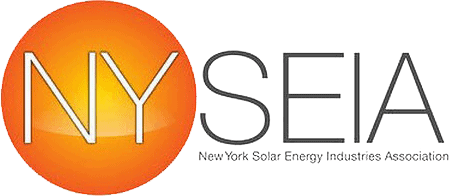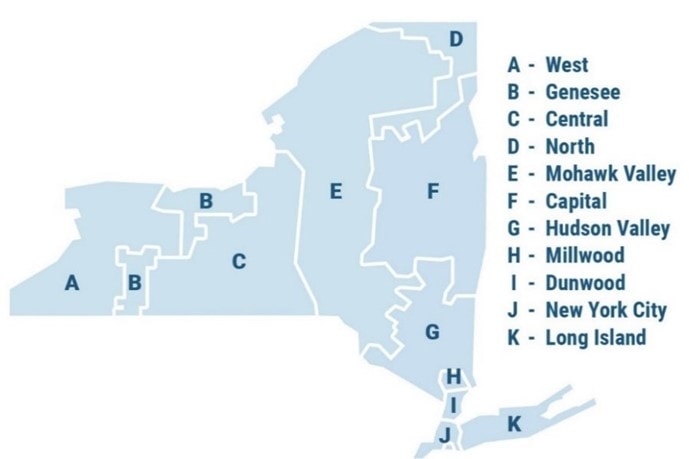New York Solar Land Leases for Community Distributed Generation
New Yorker land-owners can get a cost assessment for a community solar project.
Leasing land for solar development in New York can provide property owners with an added revenue stream. Solar land leases can generate predictable income for 25+ years, giving landowners the ability to pay taxes and offset maintenance costs of their land.
The presence of a community solar project in your area provides jobs for residents, stimulates the local economy, and provides energy independence by adding local renewable energy tothe electric grid.
Solar land leases in the New York Hudson Valley or Upstate New York are an excellent way to generate additional income without any significant upfront fees or efforts.
Is my property ideal for solar development?
Important criteria for New York land for community solar development:
- 12+ acres of land
- Near existing electric transmission lines (3-phase) & substations
- Accessible via public roads
- Preferable to have minimal slopes or minimal wetlands
- Local policy that supports solar – Most NY towns require a solar screening as part of the local town code.
- Contaminated land, brownfields, and landfill properties make great candidates!
Lease My Land For Solar
Property owners can get an option to lease land for solar development. situation to meet their specific needs.
If you own property in New York with limited wetlands and solar potential, Core Development Group can evaluate your site and work with you through the assessment and development process. First, we collect and evaluate data about your site, making sure there is enough space to accommodate a ground-mounted solar system. If the property aligns with most of the above criteria, we can provide a solar land lease or purchase offer on the property.
NY Community Distributed Generation
The Community Distributed Generation Program is administered by New York State Public Service Commission with (NYSERDA) through NY-Sun. Under this program, homeowners, low-income residents, renters, schools, and businesses can have access to clean and affordable energy.
Electricity produced by community solar projects allows subscribers to save approximately 10% on monthly electric bills, and helps support the growth of renewable energy in New York. The subscribers of the Shared Renewables Project must have at least ten members, and each individual cannot own over 25 kilowatts of renewable energy.
New York has become one of five states in the country that have the most community solar programs, all thanks to NYSERDA’s NY-Sun incentive program and Reforming the Energy Version Plan strategy.
New York’s Renewable Portfolio Standard (RPS) also recently became one of the country’s most aggressive. The RPS includes policies that require electricity suppliers of a state to source a certain amount of their electricity from designated renewable resources. New York RPS’s target is to have all electricity backed by 100% clean energy by 2040.
Learn More About Community Distributed Generation
Community solar development creates plenty of benefits for everyone in the community, and New York municipalities can access financial benefits and guaranteed savings. As electricity costs continue to rise, the transition to a less expensive, sustainable source of clean power can have a significant impact on the municipal budget. New York community solar or remote crediting can provide municipalities with annual savings on their energy costs and shift financial resources or funds toward other impactful priorities. Learn how property owners or municipalities can benefit from solar.
Contact UsBenefits of Community Solar in New York
Local Renewable Solar Energy
As New Yorkers subscribe to community solar projects, they will have access to local renewable energy. As more people subscribe to community solar projects, the local grid gets cleaner, encouraging local economies and development opportunities in your community.
Savings
Most community solar subscribers in New York will see an approximate 10% discount on their electricity bills annually. In essence, it’s like getting $10 coupons for every $100 of electricity consumed. Community solar energy is an affordable alternative to traditional electricity services. Not only do people get to save money by using solar, but it helps support the growth of the renewable energy market.
Clean Energy Access to New Yorkers
One of the greatest advantages of a community solar project is that consumers don’t need to install or maintain any solar energy equipment. The community solar host provides subscribers access to solar energy benefits in the form of credits from their local electric utility.
New York Towns and Municipalities Financially Benefit
As local governments in New York take steps to encourage solar energy growth, they can show leadership by installing solar on public facilities or other public land. They may also have the option to install solar on remediated brownfields and other examples of under-utilized land. In this way, municipalities and counties can encourage forward-thinking and show solar support by leading by example.
Unused municipal land, remediated brownfields, town wastewater treatment plants, capped municipal landfills, and large parking garages can be ideal locations for community-distributed generation or community solar projects. Leases for ground-mounted solar sites typically pay landowners for about 25+ years. Therefore, other potential productive uses of the land should be considered in the site selection. Areas with little or no alternative use (e.g., brownfields, degraded land, closed and capped landfills) may be well-suited for solar projects. These degraded and underutilized lands might have expenses associated with maintenance and security. Leasing the land for solar development, may help offset maintenance costs associated with the land. In addition, excess land in New York towns with 15+ acres can provide significant money saving financial benefits to each municipality or its citizens. Ensuring interconnection to the electrical grid is a key concern for developers. Solar projects located within proximity to three-phase transmission lines or near a point of interconnection have significantly reduced costs for equipment such as poles and wires.
Community Choice Aggregation (CCA)
Under the Community Choice Aggregation (CCA) program, some New York cities and counties may buy or generate electricity for residents and businesses within their communities. New York CCA gives governing bodies the option to purchase electricity through a shared purchasing model and distribute it to eligible residents in their municipalities. Aggregating demand for electricity gives these governing bodies more purchasing power to negotiate better rates and also choose where they get their electricity supply and the quality of that supply.
In New York, over 100 municipalities have adopted CCA programs (2023) enabling residents in those municipalities to potentially lower their energy costs and invest in cleaner, renewable energy sources. While CCA programs are always voluntary, consumers may automatically be opted in, so consumers need to manually opt out of the program if they want to choose a different energy supplier.
NYISO Zones and Solar Energy Value
The New York Independent System Operator (NYISO) (hyperlink www.nyiso.com) Map provides information about New York State’s wholesale energy market and these energy pricing zones or load zones. NYSERDA and NY-Sun developed the Solar Value Stack Calculator (link https://www.nyserda.ny.gov/All-Programs/NY-Sun/Contractors/Value-of-Distributed-Energy-Resources/Solar-Value-Stack-Calculator) to help contractors better estimate compensation for specific solar projects. Solar VDER Stack is based on the above NYISO energy pricing zones.
Core Development Group is a member of New York Solar Energy Industry Association or NYSEIA (hyperlink to https://www.nyseia.org/) providing service to all NYISO load zones and New York utility areas, including ConEdison, Orange & Rockland Utilities, NYSEG, RGE, National Grid, and Central Hudson.


Find Out How Much You Can Earn From Your Land With Solar Development
Get a free consultation on a solar land lease, without any obligations. Don’t miss the opportunity to add solar panels to your property to gain financial benefits that grow over time. Contact us today to schedule a time to talk or meet in person.








